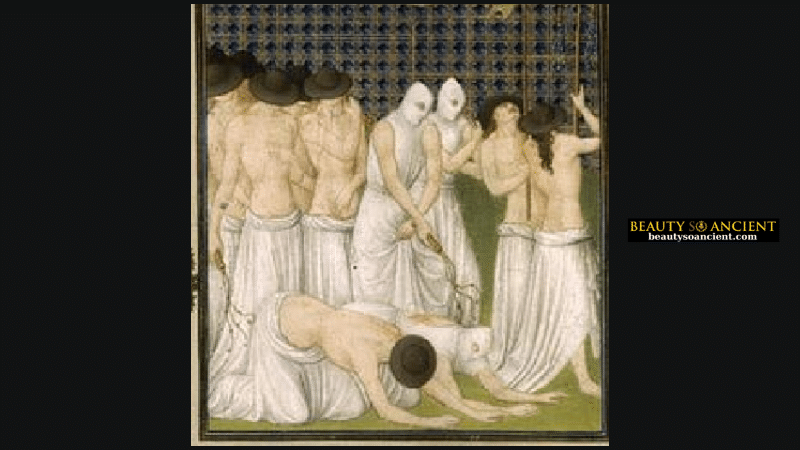Don’t Choose Your Own Mortifications; Accept the Opportunities for Interior Mortification That God Sends You
As our Creator, God knows everything about us. He knows our strengths and weaknesses. He knows where and when we need help. He knows which trials are most useful in helping us to grow in sanctity. As it turns out, we all need to practice interior mortification, and God sends us lots of opportunities for them.
What is Mortification?
Since early Christianity, the Church has encouraged a penitential life, as a way to mortify the flesh and its sinful desires. This included things like fasting and abstinence, and other more physical penances such flagellation and as use of devices like the cilice.
St Jerome refers to Fasting and Abstinence (used as a catch-all term for penitential practices) as a “… help; a disposition; a means though a fitting one, for the attainment of true perfection. ” Source.
Mortification is a good and holy thing.
What is Interior Mortification?
Interior mortification involves invisible penances that others can’t see. They occur internally. For example: When someone says something to you that makes your pride flare up and you want to respond in kind, but choose not to, you are practicing interior penance or mortification
Interior Mortification is More Meritorious Than External Mortification
When trials, tribulations and mortifications come, we should accept them.
“While exterior penances can be an important compliment to one’s spiritual progress, they are nonetheless of a secondary rank to interior mortifications, whereby we deny our will; our attachments, our preferences, our appetites, our ego, our desires for comfort, etc. These interior mortifications are considered by the saints to be the most meritorious, since they directly cut at the root of self-will and self-love”
Source
Self-Abandonment to Divine Providence
***Use coupon code BSA for 15% off
We tend to pretend to not notice the opportunities that God sends us for interior mortification.
Often, in our pursuit for sanctity, we seek our own exterior mortifications, especially around Lent.
We focus on exterior mortifications such as fasting, saying extra prayers, giving up coffee and social media, etc, etc.
These mortifications are well and good, but, how about interior mortifications?
Think about that neighbor who gets on your nerve or that online FB “friend” who pushes every button. Are you seeing these as opportunities to practice interior mortification?
Opportunities for Interior Mortification Abound
We do not have to go looking for mortifications. God gives us opportunities to practice interior or internal mortification, such as resisting pride and self-love.
St Alphonsus de Liguori, in The True Spouse of Jesus Christ, describes some opportunities for interior mortification (those that involve self-love and pride):
“There are some religious who perform a great many exercises of devotion, who practise frequent communion, long prayers, fasting, and other corporal austerities, but make no effort to overcome certain little passions—for example, certain resentments, aversions, curiosity, and certain dangerous affections.
They will not submit to any contradiction; they will not give up attachment to certain persons, nor subject their will to the commands of their superiors, or to the holy will of God.
What progress can they make in perfection?
Unhappy souls! they shall be always imperfect: always out of the way of sanctity. “They,” says St. Augustine, “run well, but out of the way.” They imagine they run well, because they practise the works of piety which their own self will suggests; but they shall be for ever out of the way of perfection, which consists in conquering self.”
The True Spouse of Jesus Christ by Saint Alphonsus Liguori
If you have been devising a mortification plan for yourself that only consists of exterior mortification, you might want to first accept the mortifications that God sends you. Then, look for others.
***Use coupon code BSA for 15% off
In Addition to Accepting Interior Mortifications, Accept the Exterior Mortifications God Sends
Even before picking up that flagellum, God gives us plenty of physical mortifications that God already sent us, as Fr Gabriel of St Mary Magdalen, O.C.D, says in Divine Intimacy.
“The true spirit of mortification embraces, in the first place, all the occasions for physical or moral suffering permitted by divine Providence. The sufferings attendant on illness or fatigue; the efforts required by the performance of our duties or by a life of intense labor; the privations imposed by the state of poverty – all are excellent physical penances.
If we sincerely desire to be guided by divine Providence in everything, we will not try to avoid them, or even to lighten them, but will accept wholeheartedly whatever God offers us. It would be absurd to refuse a single one of these providential opportunities for suffering and to look for voluntary mortifications of our own choice. Likewise, it would be foolish for those in religious life to omit the least exercise imposed by the Rule in order to do a penance of their own choosing.”
After accepting the interior and exterior mortifications that God sends us, then if you decide to pick up a flagellum (or not!), we won’t object.
Be sure to check with your spiritual director first, of course.
Join in the conversation. Do you find exterior or interior mortifications harder?
Mortification Resources
- The Ideal of Reparation by Raoul Plus, S.J.
- Self-Abandonment to Divine Providence
- Divine Intimacy
- Jesus Living in Mary: Handbook of the Spirituality of St. Louis Marie de Montfort
- Manual for Suffering
- The True Spouse of Jesus Christ by St Alphonsus Liguori












Thank you for this very useful reflection!
Thank you❤️
This is wonderful! Finding a way to offer something in every day life as a sacrifice for God will really help prepare me during these 12 preliminary days before I renew my Consecration to Mary. It’s about integrating God into everything we do, even the smallest of tasks.
love reading ypur posts GOD BLESS Y !https://holyfaceofmanoppello.blogspot.com/2020/09/annual-celebration-of-life-of-servant.html
Are you the one who is copying and pasting my site contents on bogtevoli.com. If you are, it is thievery. You do not have permission to copy my content and repost it on your blog. It’s one thing to include an excerpt and point back to my page. It’s another to just copy the whole thing and paste it. It’s not godly and it’s stealing. I will be taking legal action.
Accept the Exterior Mortifications God Sends!
“But our very own ideas, the fruit of our mind and heart, form a treasury on which none dare lay hands. For instance, if I reveal to a Sister some light given me in prayer, and she repeats it later on as though it were her own, it seems as though she appropriates what is mine. Or, if during recreation someone makes an apt and witty remark, which her neighbour repeats to the Community, without acknowledging whence it came, it is a sort of theft; and the person who originated the remark is naturally inclined to seize the first opportunity of delicately insinuating that her thoughts have been borrowed.
I could not so well explain all these weaknesses of human nature had I not experienced them. I should have preferred to indulge in the illusion that I was the only one who suffered thus, had you not bidden me advise the novices in their difficulties. I have learnt much in the discharge of this duty, and especially I feel bound to put in practice what I teach.
I can say with truth that by God’s grace I am no more attached to the gifts of the intellect than to material things. If it happens that a thought of mine should please my Sisters, I find it quite easy to let them regard it as their own. My thoughts belong to the Holy Ghost. They are not mine. St. Paul assures us that without the Spirit of Love, we cannot call God our Father.[1] And besides, though far from depreciating those beautiful thoughts which bring us nearer to God, I have long been of opinion that we must be careful not to over-estimate their worth. The highest inspirations are of no value without good works. It is true that others may derive much profit therefrom, if they are duly grateful to our Lord for allowing them to share in the abundance of one of His privileged souls; but should this privileged soul take pride in spiritual wealth, and imitate the Pharisee, she becomes like to a hostess dying of starvation at a well-spread table, while her guests enjoy the richest fare, and perhaps case envious glances at the possessor of so many treasures.
Verily it is true that God alone can sound the heart. How short-sighted are His creatures!“
— The Story of a Soul: The Autobiography of St. Thérèse of Lisieux